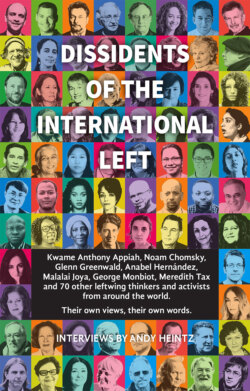Читать книгу Dissidents of the International Left - Andy Heintz - Страница 16
На сайте Литреса книга снята с продажи.
ОглавлениеJUAN COLE
Juan Cole is Richard P Mitchell Collegiate Professor of History at the University of Michigan. He has tried to place the relationship between the West and the Muslim world in a historical context, not least via the website he founded, Informed Comment. He is a regular guest on PBS’s Lehrer News Hour and is a regular columnist for Truthdig and The Nation. He is the author of The New Arabs, Engaging the Muslim World and Napoleon’s Egypt.
Could you talk about the differences in the way the press covers Saudi Arabia compared to Iran?
The coverage of the Middle East in the American mass media is shameful and really hews very closely to the government line. Negative adjectives are used for regimes like that of Iran that are at odds with the United States, whereas positive adjectives are used for a regime like Saudi Arabia. Saudi Arabia is a major abuser of human rights and an absolute monarchy. It’s engaged in a brutal aerial bombing campaign in Yemen that clearly involves war crimes. Without expressing any support for Iran or its policies, I would say the press certainly doesn’t treat the two countries fairly or in a dispassionate way.
Can you discuss the CIA’s role in the 1953 coup in Iran?
The US media and public complain about the negative statements made by Iranian leaders toward the United States today. But those leaders were involved in a revolutionary struggle in the 1960s and 1970s against a dictator, the Shah of Iran, who was imposed on the Iranian people by a CIA coup. So, if you understand that history, while you would hope for more maturity on the part of the Iranian leadership, you can certainly have a better idea of why there are strong resentments towards US policy in Tehran.
Do you think the word terrorism has been politicized?
The words ‘terrorism’ and ‘terrorists’ are frankly without any meaning any more. In the Federal Code back in the 1990s there was a definition of terrorism which I thought was maybe useful for social scientists: ‘The use of violence by non-state actors against civilians for the purpose of political gain.’ In other words, violence being directed against civilians. So, you have a small group of people whom nobody elected who exercise violence against the civilian population to get what they want put in place: that’s terrorism. That was a pretty good definition but it’s not generally the one being deployed by politicians or the press when they talk about terrorism. And, yes, the US has supported a large number of such groups. The Contras in Nicaragua in the 1980s are an example. There isn’t any doubt that, where there was a government in Nicaragua the US didn’t like, its intelligence security apparatus had no compunctions about supporting violent insurgencies against that government. This included groups that were engaging in what the US Federal Code would have defined as terrorism.
I think the other side of the coin is that the US uses the term terrorist for groups that are often anti-occupation and national liberation movements. The Algerians who fought the French in the late 1950s and early 1960s certainly did employ terrorism, but they were more than just a terrorist group, and they prevailed against the French and became a country in 1962. But from the Western point of view the National Liberation Front was a terrorist organization. The inability to see anti-occupation or national liberation groups as having a legitimate political orientation is a blind spot in the West.
Do you think the nations with permanent membership of the United Nations Security Council have too much influence?
The Security Council has a lot of problems. One of its problems is that it’s not powerful enough and it can only really call for countries to do things; and if they don’t want to do these things there’s nothing the Security Council can do about it. It’s also internally divided so it’s rare that all five permanent members can agree on some policy. Since they all have a veto, in most instances the Security Council is irrelevant. I think that’s unfortunate and that the veto ought to be abolished. The permanent members of the Security Council have undue power because they don’t reflect the geopolitical realities of our temporary world. It’s crazy that Brazil and India are not permanent members of the Security Council. And if you’re going to put in India, you might as well put in Pakistan as well. I could think of at least three major powers that should be added as permanent members, and their absence has made the organization very unbalanced.
Can you talk about how the veto has been used by members of the UN Security Council to prevent action against genocidal regimes?
It certainly prevented intervention to stop Milošević’s actions in the former Yugoslav Republic because of the Russian veto. Syria is another example. The Bashar al-Assad regime in Syria is genocidal, and the world hasn’t been able to do anything about it because of the Russian and Chinese veto. ■
